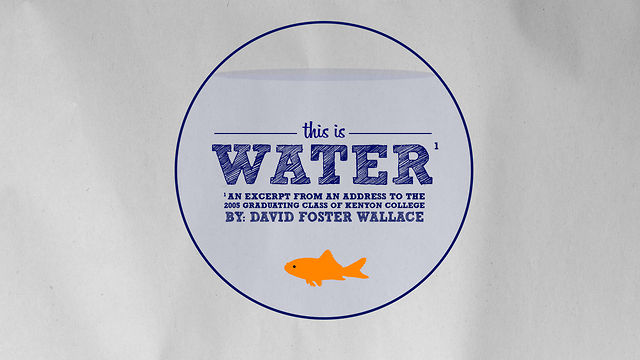[See end of post for image credit]
To David Foster Wallace by Ben Wilkinson
Since I was old enough to know myself
I’ve been trying to figure it out –
the constant gnawing sense of having
had and lost some infinite thing,
like half the time I’d chuck it all in;
throw the whole lot for a song.
I’ve been thinking it over again,
but more than that – it’s always there
though you can dupe yourself into
thinking it’s not, but dupe is wrong:
it’s good as gone just so long
as I keep on, know that it’s waiting.
You know what I mean. You know
like you knew what everyone with an ounce
of self-reflection feels or will feel,
can’t put into words – my chest
bumps like a dryer with shoes in it.
I feel despair. The word’s overused
and banalified now, despair,
but it’s a serious word and we’re using it
seriously. It’s not desiring the fall;
it’s fearing the flames. It takes
great personal courage to appear weak.
We all worship some hidden belief.
Here’s mine: that if I prove enough
to myself I might stop and think
deep down, I’m not a piece of shit.
Get it? No punchline, just this sick
inertia turning in the stomach,
like the moment before
the accident happens, stretched out
indefinitely. Diluted panic:
dissolve one part into five parts
excuse for a human being.
Brief interviews with hopeless men.
That’s shit: I can’t make you
feel what I felt. So I try again –
stuck after work in some queue,
like you, like all of us going about
the tedium that strings our lives
together: paperchain people,
baskets lined under strip-lights.
Zone out the muzak. Focus. Try
to ease the unpindownable feeling
of hopelessness, hard frustration:
choose to see this moment
as radiant within the cosmos,
or bring another interpretation.
We’re all utterly alone, but we’re
utterly alone in this together.
Total and particulate as weather,
this queue shares its riffs
on all our dreams and nightmares
with each other, though all of us
wait for something to happen
as if we aren’t part of it, hurrying
on to somewhere else. David,
days I’m up to here with this bullshit.
I know I’m not the only one.
You’re long gone, and anyway
no prophet. No-one can grant us
the will, patience or grace to go on;
least of all the self-loathing, cut-up
fool I’ve become, or always was.
Time waits for no man –
a platitude you’d have ridiculed
only to then prove true. Time,
as the poet said, licks its steady way
through stone – though it can stand
still, if you really want it to.
To which: if you buy that, you’ll buy
anything. But I remember
running pure gradient in wind and rain,
my breath dogged on the fellside
only to round a corner into a peace
I’d never known awake: just the sound
of my bolting heartbeat, as rippled
sunlight carried across the tarn. I go
back to that time and again, when the
listless dark starts to creep in. But I sound
like I’m preaching, and that’s not what
I meant – your smarts always came
without the pious crap. You never know
when it’s coming, and that’s the kicker
alright. Someone once called you
the voice of your generation; I’ll buy that,
even though you’d shrug it off. This is all
we’ve got. I hit my thirties still hoping
against hope I can turn meagre words
into actions. Wish me way more than luck.
- The American novellist and essayist David Foster Wallace (from here on, DFW) was born in Ithaca, New York on 21 February 1962, and died in Claremont, California on 12 September 2008.
- I think that those are all the sufficient details you need to enjoy the poem ‘To David Foster Wallace’ by Ben Wilkinson.
- I hesitate so early in the blog to send you off elsewhere, but if you’d like to find out more about him before carrying on with this, and / or re-reading the poem, well, here is the Wikipedia page: https://en.wikipedia.org/wiki/David_Foster_Wallace and here is what is commonly thought of as the best / most comprehensive ‘fan’ website on / about him: http://www.thehowlingfantods.com/dfw/
- No doubt, as fine, educated and cultured readers, you will at least have heard of his most famous work, Infinite Jest.
- If not read it. I mean, even people who really, really like DFW’s work have not read it.
- I mean, they will say they have, but then you look them in the eye, and ask them again, and they’ll cough, splutter a bit and say, “Well, have you?”
- And then you’ll avoid their eye for a bit.
- I digress.
- I digress with a purpose, as at first glance this, this digression with a purpose, could be described as a fair summary of DFW’s main rhetorical trope, across both his fiction and his non-fiction.
- The immersion in, the larding on of detail and data, fact and fact, until clauses, sentences could bear no more. And yet they never broke.
- Of course, he always got to his point in the end.
- But my word if it didn’t feel like he had told you *everything* about a particular subject first.
- The magical thing was though, that if you were of the right cast of mind, this prose technique felt like a revelation.
- Like someone had finally – finally! – captured the unceasing skittering of thoughts, non-sequiturs, conversational balloons, random musings, japes, lunacy &c that raced across your brain, captured them, put them on a page, then presented them back to you and said: “See, you are not the only one who thinks like this.”
- And, if exposed to this at the right time, and the right age, well, it’d be enough to make you his for life.
- By his, I don’t mean in a biblical or prophet sense.
- Though since he has died, that is almost precisely what some people have set DFW up to be, a charge that Wilkinson acquits him of, for him, Wilkinson, at least.
- No, what DFW could give you, through his style, his maximalist style (which certain critics came to christen ‘hysterical realism’) was the sense – the knowledge – that someone out there was asking the right questions.
- About how to live. How to be.
- Which is what we want from our big, serious writers.
- Not just entertainment. But the ‘truth’.
- Someone who, as Wilkinson says can help with the following:
Since I was old enough to know myself
I’ve been trying to figure it out –
the constant gnawing sense of having
had and lost some infinite thing,
- Now, I should at this point make clear that, on this reading Wilkinson has accurately captured what will become over time, the preferred image of DFW that other writers, scholars, the academy will wish to give him.
- The Midwestern moralist, the man who in rejecting the East Coast / NYC literary establishment that he could have chosen to have lived in – dominated – instead found his way to a greater nobility / sense of purpose etc etc.
- (BTW, beware death doing this to the reputation of a writer you may love.)
- The writer who has the potential to become – hell, has actually become – the object of a devoted cult.
- And this is where the poem is really good, as it absolutely nails why this might be the case, why DFW attracts the attention of over-earnest, over-educated young men who haven’t yet learnt that at times it is fine not to think if it helps you to survive.
- I speak of what I know, as I was that over-earnest, over-educated young man.
- And I fear that I still am, despite getting older.
- And, bluntly, Wilkinson has me bang to rights: “No-one can grant us / the will, patience or grace to go on; / least of all the self-loathing, cut-up / fool I’ve become, or always was.”
- I suppose I should at this point draw your attention to the interpolations of DFW’s work that litter the poem; but you know what, I’m really not a fan of that sort of textual Cluedo when it comes to reading a poem.
- Suffice to say that, very obviously works by DFW referenced in the poem include Brief Interviews with Hideous Men, a collection of short stories, and This is Water, a printed version of a commencement address that DFW gave at Kenyon College in 2005, and which has more than anything, given him the status that he now has.
- Even if we fans of his fight shy of it.
- Because much as it pains me to take issue with the poem, I feel I have to.
- Because if this is your only exposure to DFW, well, I feel you’ll get a very one-dimensional view of him.
- And part of the trouble with trying to encapsulate him is the fact that his genius was so baggy, so capacious, that it could stretch across anything, and roam through all sorts of intellectual terrains.
- So he wasn’t just a Midwestern moralist. But also (deep breath): a philosophy major; a mathematician, or at least adept enough to write a book about infinity which was accessible to inclined layman (I know as I read that book); a snoot (his way of saying an extreme usage fanatic when it came to langauge); an addict; a fan of hip-hop; a tennis player (and a pretty good one); and potentially (as I don’t feel versed enough to judge either way) a misogynist.
- I’m aware that I’ve thrown that last one out there without any form of explanation whatsoever. Trust me, I’m really not the person to wade in to it, and express a view either way.
- And did I mention he was funny? Fucking hell, he was at times an absolute scream.
- Imagine Garrison Keilor on speed, where nothing – absolutely nothing – would escape his eye.
- And he was very much an alpha male too, one very aware of his position in the canon of American writers, one always worrying about where he stood in relation to friends and rivals, such as Jonathan Franzen.
- I say all this not to in any way suggest Wilkinson’s reading of DFW is in anyway wrong, for it is not and it is very, very true.
- But it is not all.
- And I would hate for you to think that once you have read this poem, you have ‘done’ DFW in some way.
- Because you really haven’t.
- You haven’t really begun.
- You have seen a glimpse of a kind, keening intellect wrestling with the world as it is, and as it could be, trying to reconcile his place within it.
- And treating this challenge with the ultimate seriousness it deserves.
- Because it is the true challenge of life.
- And I haven’t even mentioned the footnotes.
- Another time.
Rishi Dastidar
[Image at top is from The Glossary’s visual interpretation of the original recording (abridged) of DFW’s speech. See here]






